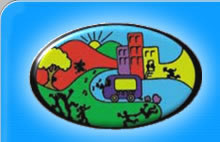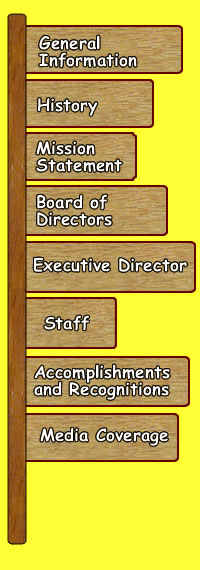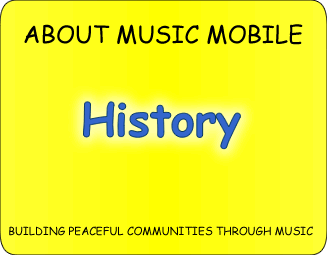  | ||
| ||
|
How did Music Mobile get started? In 1977, musician and educator Ruth Pelham proposed an idea to the City of Albany to increase the availability of summertime cultural and recreational services to low-income children and families in Albany’s underserved neighborhoods. Very enthusiastically, the City of Albany embraced her idea, agreed to provide financial support, and thus Music Mobile was born. What did Music Mobile do? In a colorful van decorated with children’s drawings, the Music Mobile traveled to parks, playgrounds, street corners and public housing sites to engage children in interactive programs that fostered cooperation, self-esteem, neighborhood pride, appreciation of multi-cultural diversity, and learning. Activities included group singing, songwriting, instrument building from recycled materials, cooperative games, and creating and displaying children’s artwork in local stores. | |
| After Music Mobile was established, how did it begin to grow? Within a year, still with sole support from the City of Albany, Music Mobile’ programs expanded to include in-school and after-school programs for elementary grade students. Increasingly successful and still growing, in 1979 Music Mobile became established as a not-for-profit educational organization and began to receive grants and contributions from area foundations, businesses and individuals. In 1981 Music Mobile expanded beyond the City of Albany to provide statewide fee-for-service workshops, concerts and training programs for schools, community agencies, municipal playgrounds, and state parks. At what point did Music Mobile start providing programs for adults? In 1982, Music Mobile developed “Songstories,” an oral history and songwriting project for older adults in senior citizen centers and nursing homes. The same year, Music Mobile introduced “Warmin’ Up The Winter,” a concert and workshop program for adults in hospitals and homeless shelters. When did Music Mobile begin its international work? In 1985, Music Mobile began its international programs by collaborating in a cultural exchange program with five cities in the former Soviet Union, and then in 1986 instituted a ten year cultural exchange program with the Havasupai Tribe located in the bottom of the Grand Canyon. In 2002, Music Mobile was invited to bring its programs to Sri Lanka where Ruth Pelham participated in a month-long Children’s Rights Project by singing in villages through out the small, island country. Most recently, Ruth Pelham returned to Sri Lanka to represent the Friends of Sri Lanka Fund, a grassroots tsunami relief initiative that she founded and coordinated with two Sri Lankan friends. Ultimately, the Fund raised $94,430. While in Sri Lanka, Ruth sang, built musical instruments, and made drawings with children in schools and a refugee camp. When did Music Mobile begin its training and professional development programs? Since the early days of Music Mobile, Ruth Pelham has been presenting workshops and training programs that bring her pioneering method of teaching and communicating to a broad spectrum of parents, teachers, youth workers, and human service professionals. When did Music Mobile begin developing educational resource materials? In the mid 1980’s, Music Mobile began developing and distributing educational resource materials including activity books, recordings, board games, calendars, and videos. These materials became incorporated to enrich our programs for children and families, to enhance our training programs for teens and adults, and can be purchased online at the Music Mobile store. With such a rich history, is there documentation of Music Mobile’s pioneering work? Along with nearly 30 years of stories, memories, interviews, newspaper articles, and letters of appreciation, there is a documentary called “Music Mobile: The Beat of the Street” that was produced and aired on public television in the late ‘90’s. In 2006 Ruth Pelham began plans for writing a book about Music Mobile as a way of inspiring others to live their dreams and make a positive difference in the world.
| |
 | ||



